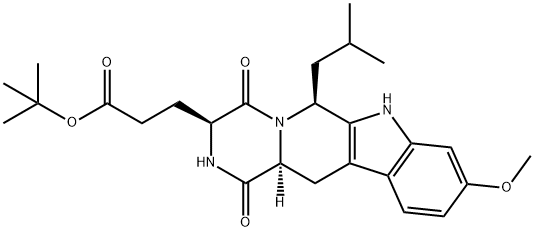Breast cancer resistance protein (BCRP) is an ATP-binding cassette protein known also as ABCG2. While it normally functions as a high-capacity urate exporter in the renal system, it also acts as a xenobiotic transporter and contributes to multidrug resistance (e.g., to mitoxantrone) in certain types of cancer. BCRP is abundant at the intestinal epithelium and blood-brain barrier, potentially restricting the distribution of certain drugs. Ko 143 is a potent and selective inhibitor of BCRP, preventing the export of mitoxantrone and topotecan in breast cancer cell lines (EC50s = 23 and 26 nM, respectively). It is much less effective at the transporters P-glycoprotein and multidrug resistance-associated protein 1, MRP1. Ko 143 is effective in vivo in mice.

